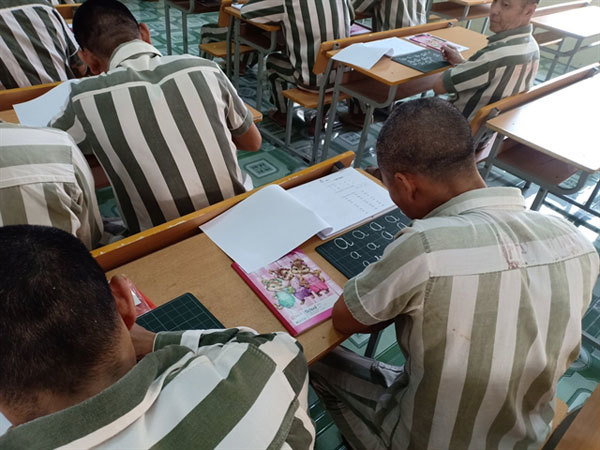And in one extreme case, a German national who has served his sentence is happy to stay in the prison because he feels that is now his home.
 |
| Foreign prisoners at a Vietnamese language lesson in Vinh Quang Prison. Photo antg.cand.com.vn |
Jurgen Michael has been a free man for almost a year, but instead of returning to his homeland he prefers to stay in prison.
“I like living here. I don’t want to go home. This is my second home,” said the 60-year-old.
“Vietnamese officers are good and friendly. They treat me very well. They give me banh chung (square glutinous rice cake), gio (Vietnamese sausage) and candy to celebrate Tet (Lunar New Year) with Vietnamese people. I have a lot of fun while living here so I don’t want to go anywhere.”
When he was first jailed he did not speak a word of Vietnamese, but after spending so long behind bars he has picked up the language.
Back home in Germany he has no family, so for Jurgen, Vinh Quang is his home, and the inmates are his family. And he is not alone.
Many other foreign inmates have accepted their sentences and are doing their best to build a new life behind bars, reports Công an nhân dân (The People's Police)
Laos national Khamphy was jailed for 20 years after he was caught in possession of heroin.
“My uncle and father used to visit me from time to time,” said the 32-year-old.
“But last year, due to COVID-19 pandemic, they couldn’t do so and I didn’t receive any support from them. However, the officers here take good care of us.”
Since his conviction 10 years ago, Khamphy has done his best to integrate with the rest of the inmates, even taking part in a talent competition held by the prison.
“It’s here I have learned so many songs that I’ve never knew before. The officers also offer me vocational training and care for me when I am sick.”
According to Senior Lieutenant Colonel Ta Van Luong, deputy warden of Vinh Quang Prison, many foreign inmates can speak Vietnamese. They don’t only communicate with each other but also sing songs, read poems and perform skits.
In addition to helping prisoners recognise their wrongdoings and become better people, the prison has organised many activities to enhance their spiritual lives.
They are also taught Vietnamese, to gain a better understanding of Vietnamese culture.
Ben is another inmate who has had to make serious adjustments. A life sentence handed down for drug trafficking offences means he will likely never be a free man again.
Knowing your life is finished, and with a Vietnamese wife on the outside, Ben suffered when he was first jailed. But gradually he has come to accept his life behind bars.
He said: “I was very sad and depressed but the supervisors have given me a lot of encouragement. Gradually, I regained my spirits.
“I have maintained a good rehabilitation record so I hope to get an amnesty. If I am freed, I’ll stay in Vietnam because I love Vietnam like my home country.”
Ben has also become part of the prison choir. He can sing many songs in Vietnamese but one is by far his favourite.
“Now I sing the national anthem of Vietnam very well," Ben said.
"I understand the meaning of the aspiration of the entire Vietnamese nation – that is to gain independence and freedom.
“Since being at the prison, I take part in different activities including vocational training, academic education and art. I feel comfortable here.
“Every day after work, I practise singing or write letters to my family.”
Life nearly always means life in the Vietnamese judicial system, but Ben still holds a glimmer of hope that one day he can prove he has paid his price to society.
And if that day comes, it will be Vietnam where he will spend the rest of his days, hopefully as a free man. VNS

Life-changing opportunities come to foreign prisoners
Officials at Thu Duc jail have turned it into a place of education and support for its nearly 200 foreign prisoners, helping them become a better version of themselves before returning home.